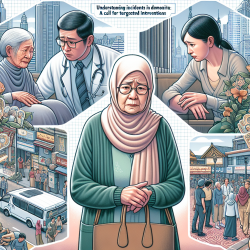Introduction
As a practitioner in the field of special education, you are always looking for ways to enhance your skills and provide the best support to your students. But what if you could learn from research in other fields, such as psychosocial oncology, to improve your practice? The research article titled ‘Weighing’ Losses and Gains: Evaluation of the Healthy Lifestyle Modification After Breast Cancer Pilot Program offers valuable insights that can be applied to your work.
Understanding the Research
This study focused on developing and evaluating an online group-based intervention for breast cancer survivors (BCSs) aimed at promoting healthy lifestyle changes. The intervention, known as Healthy Lifestyle Modification After Breast Cancer (HLM-ABC), was designed to yield beneficial physical outcomes, such as weight loss and increased physical activity, as well as improvements in psychosocial well-being, including self-efficacy and motivation.
Key Findings
- Participants experienced a modest weight loss but achieved significant gains in physical activity and intuitive eating habits.
- There was a notable improvement in participants' body image and self-compassion.
- The program highlighted the importance of addressing both physical and psychosocial aspects of health.
Applying Insights to Special Education
While the research focuses on breast cancer survivors, the principles can be adapted to the special education context. Here are some ways to implement these insights:
- Promote Holistic Well-being: Encourage students to engage in activities that promote both physical and emotional health. This could include incorporating mindfulness practices and physical exercises into the daily routine.
- Foster Self-Efficacy: Help students build confidence in their abilities by setting achievable goals and celebrating small successes.
- Encourage Intuitive Learning: Just as intuitive eating focuses on listening to one's body, intuitive learning encourages students to trust their instincts and learn at their own pace.
Encouraging Further Research
The study underscores the importance of ongoing research to refine and expand interventions. As a practitioner, consider collaborating with researchers to explore new strategies that can benefit your students. By staying informed and involved in research, you can continue to enhance your skills and provide the best support possible.
To read the original research paper, please follow this link: ‘Weighing’ Losses and Gains: Evaluation of the Healthy Lifestyle Modification After Breast Cancer Pilot Program.










